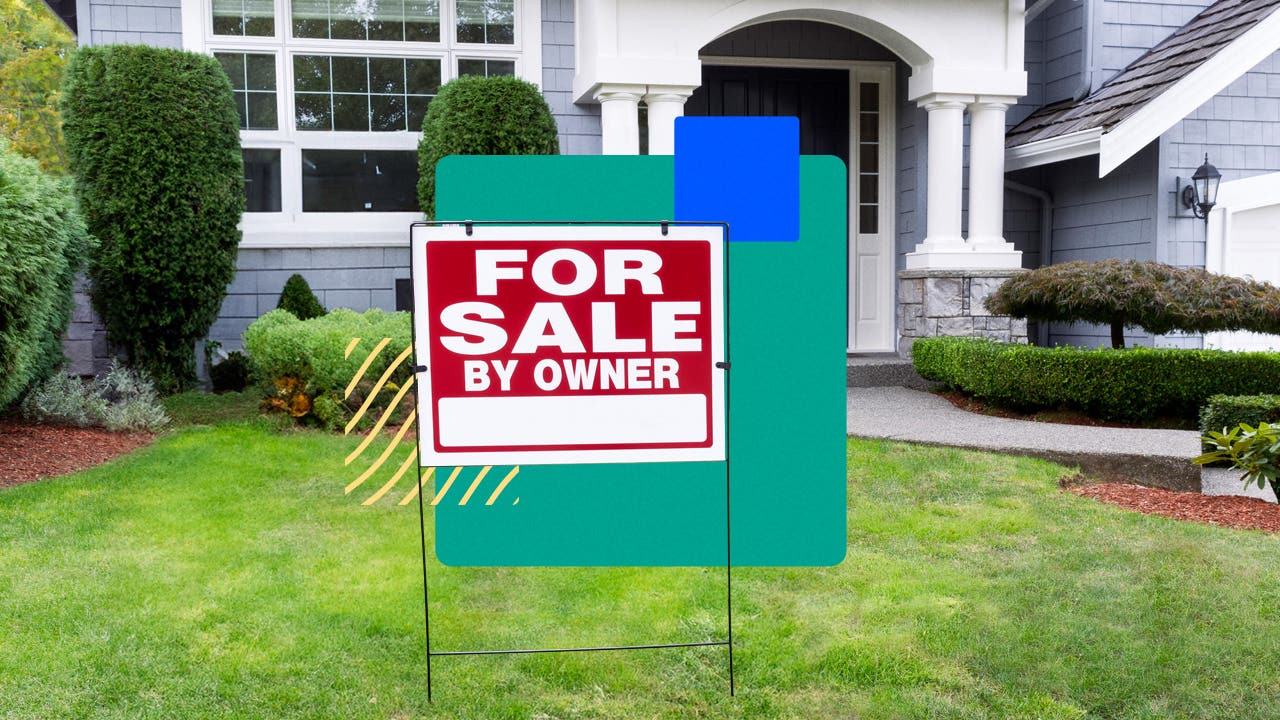FSBO meaning: For sale by owner, explained

The Bankrate promise
At Bankrate we strive to help you make smarter financial decisions. While we adhere to strict , this post may contain references to products from our partners. Here's an explanation for .
Our writers and editors used an in-house natural language generation platform to assist with portions of this article, allowing them to focus on adding information that is uniquely helpful. The article was reviewed, fact-checked and edited by our editorial staff prior to publication.
Key takeaways
- FSBO is an acronym that stands for For Sale By Owner.
- In a FSBO sale, the homeowner handles their transaction without the help of a real estate agent, taking on all the responsibilities an agent normally would.
- While this can save money in commissions, it requires a lot of work and may result in a lower sale price.
Your home is most likely the biggest-ticket item you own. So when it comes time to sell it, it’s natural to want to maximize your profit.
Depending on whom you ask, the for sale by owner model — also known as FSBO, pronounced “fizz-bow” — can be a terrific money-saving way to sell your home. Or, it can be fraught with headaches and actually net you less profit at the end of the transaction.
Those who have sold a home before may find it easy, while newbies may be quickly overwhelmed. Here are some things to consider when deciding whether FSBO is right for you.
What does for sale by owner mean?
FSBO’s meaning is literal: “For sale by owner” means the owner is choosing to market their property for sale on their own, without hiring a real estate agent. The owner is selling their property directly, not through a third party. Many sellers who go this route do so because they want to save money by not having to pay an agent’s commission.
When real estate agents are used in a home-sale transaction, they are paid a percentage of the price the home sells for. This amount is negotiable but typically ranges between 5 and 6 percent, which is split evenly between the buyer’s agent and the seller’s agent. The U.S. national average for real estate commissions as of August 2023 was 5.37 percent, according to data from Clever.
If you sell your house for $400,000, a 5.37 percent commission would come to $21,480. Hypothetically, then, if you sell without an agent, you save half that amount, or $10,740.
It’s important to remember that the seller typically covers both agents’ commissions — so, even though FSBO saves you money by not having an agent of your own to pay, you do still have to pay your buyer’s agent.
How for sale by owner works
There are a variety of ways the FSBO arrangement can work. In a typical FSBO sale, the seller takes on all the responsibilities typically handled by a real estate agent. This includes researching market value, setting an appropriate listing price, marketing the property and arranging open houses and tours, as well as negotiating the terms of the sale.
Instead of doing it all themselves — it’s a lot of work! — FSBO sellers can also choose to use one of many services available that help with some of the elements of selling a home. Examples include:
- Local flat-fee listing services, like MLS 4 Less Realty in New York state, will list a home on the local multiple listing service (MLS) and advertise it online for a flat fee. These companies also have tiers of service that offer more for a higher fee, such as professional photography, video tours or open houses.
- Online sites like FSBO.com and ForSaleByOwner.com also offer tiered packages that can include yard signs and other services.
- Many large real estate companies and low-commission agents (or “discount brokers”) will list your house for less than the traditional 2.5 to 3 percent listing agent’s commission. Redfin, for example, charges a 1.5 percent “listing fee” when you sell with them, and if you both sell your current house and buy a new one with them, that fee goes down to 1 percent.
- FSBO sellers can (and should) also opt to work with a real estate attorney to draw up and review contracts, though of course that will incur legal fees.
For sellers who prefer expert assistance throughout the process, FSBO might not be the best option. “A real estate transaction is riddled with small tasks that can snowball if you’re not careful,” says Christine Dupont-Patz, broker and co-owner at RE/MAX of Cherry Creek in Denver.
Is FSBO the same as owner financing?
No: For sale by owner may sound similar to owner financing, but the two are unrelated. With owner financing, the property owner finances the buyer’s purchase themselves, rather than the buyer taking out a mortgage with a bank or traditional lender. It has nothing to do with whether a Realtor is involved in the process or not — a homeowner can offer owner financing with or without using a real estate agent.
Who draws up the purchase agreement in a FSBO transaction?
In a conventional home sale with two real estate agents, the listing agent typically creates the contract or purchase agreement. However, in a FSBO transaction, the buyer’s agent may take on this responsibility. “Depending on the state, the buyer’s agent would be writing and presenting the offer,” Dupont-Patz says. “If neither party is represented by an agent, each party should consult a lawyer.”
Does FSBO save you money?
This can be a double-edged sword. On the one hand, FSBO sellers do save money by not paying a real estate agent to market and sell their home. But on the other hand, doing all the work of an agent yourself is a serious time commitment, so you’re really working hard to earn that savings. And the savings may not amount to as much as you think.
Homes sold by owners actually tend to sell for less than those sold by professional agents. According to the National Association of Realtors’ Profile of Buyers and Sellers report, FSBO homes in 2022 sold for a median price of $225,000, while agent-assisted sales went for a median of $345,000 — that’s a difference of more than $100,000, considerably more than the 2.5 or 3 percent you stand to save.
Of course, given that these pro-Realtor figures come from Realtors, you might want to take them with a grain of salt. But the logic holds true. “There’s some nuance within the NAR numbers,” says Jeff Ostrowski, Bankrate’s principal mortgage writer. “Owners of less valuable properties are more likely to sell without a Realtor, and I don’t think a Realtor really is going to command a 50 percent premium. However, it makes sense that do-it-yourself sellers realize lower prices — Realtors are marketing to a much broader audience. It’s worth noting, too, that the share of FSBO owners has dropped over the years as Realtors have begun to market discounted commissions to those who don’t want to pay a full fee.”
Selling by owner doesn’t save you money in closing costs, either. You will still need to pay any mortgage settlement fees, transfer taxes, outstanding homeowner association fees and property taxes, and other expenses related to the sale.
Can using a real estate agent get you more money?
“There are so many reasons why an agent can help you sell your home for more money,” Dupont-Patz says. “An agent will create a comparative market analysis to give a complete picture of what has sold in your neighborhood. They can also look critically on how your home is different from what has sold and adjust. Their knowledge also extends to identifying and avoiding the latest fraud schemes, crucial in transactions involving significant fund transfers.”
Other ways agents can help include professionally marketing your property and giving advice on potential staging and improvements or repairs.
In addition, an agent works as a buffer between you and the buyer, which can be incredibly useful for objectivity. “Having strangers be critical about your personal space can feel like an attack,” she says. “Homeowners are often emotionally invested and may inadvertently overprice their listings, expecting buyers to counter with lower offers. However, this strategy may backfire, as buyers tend to skip over overpriced listings. ”
FSBO pros and cons
Selling a home by owner can be complex, and it’s important to understand what FSBO can do for you — and what it can’t.

Pros
- You save money by not having to pay a listing agent’s commission.
- You have complete control over the selling process.
- There’s no outside pressure from a real estate agent.

Cons
- You still have to pay your buyer’s agent’s commission.
- Your home may not sell for as much money.
- You have to do a lot of work yourself, with no professional guidance.
Bottom line
Selling your home on your own is certainly possible, but it is a lot of work and doesn’t guarantee any significant savings. If you have experience and confidence in your knowledge of real estate transactions, it can be a good option. It can also work for sellers who do not want to give up any aspect of control to anyone else. However, the typical home seller will benefit from professional agent representation, both financially and by having an expert working on their behalf to handle all the details. If you do choose to go the FSBO route, be sure to have all the paperwork looked over by a real estate attorney.
Related Articles



